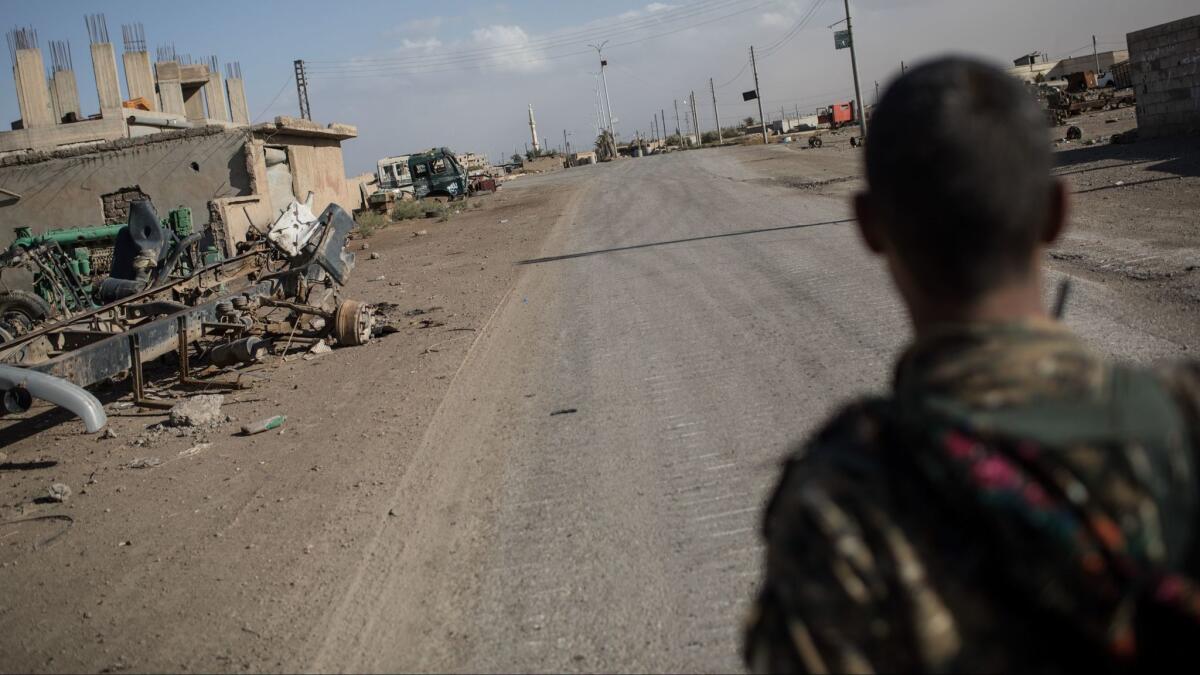Op-Ed: Trump expansion of U.S. land mine use may cause more civilian casualties, alienate allies

Before the global land mine ban in 1997, as many as 25,000 civilians lost their lives each year because of the explosive devices and thousands more were permanently injured. Far too often, those victims were innocent children walking to school, retrieving water, playing near these silent sentinels.
Since the ban, casualties have been cut by about 75%, but they still average around 6,500 a year.
The U.S. never fully participated in the global ban, and now the Trump administration has reversed a policy that kept U.S. forces from using anti-personnel land mines outside of the Korean peninsula. The new policy, issued Jan. 31, permits combat commanders to once again use the weapons in other areas of potential conflict because the restrictions had put American forces “at a severe disadvantage,” according to a White House statement. The U.S. has not deployed new land mines since 1991.
Expanding land mine use could reverse decades of progress by causing more civilians to be maimed or killed.
The policy broadens the use of land mines, with some caveats. Although the U.S. military can now employ self-destructing land mines around the globe, only four-star generals can include them in war plans and the Defense secretary must personally approve deploying the mines, Task & Purpose reported.
Land mines — even “smart” ones capable of destroying themselves — put our troops as well as innocent civilians at risk, with minimal potential benefits to our armed forces. High-level U.S. commanders have long argued that land mines are not a weapon worth keeping in our arsenal, borne out by the reluctance of many to use them during the Gulf War. A comprehensive study of anti-personnel land mine use demonstrated that the risks of losing troops to your own land mines outweighs their potential value.
Their anticipated use impedes our ability to effectively cooperate with our military allies because of their obligations under the land mine ban treaty. And worst of all, this new policy may reopen a Pandora’s box, essentially giving a green light to those deterred by the existing strong norms against land mine use and possibly encouraging those who comply with the international ban to join the U.S. in reversing course.
When the United States openly proclaims the acceptability and advisability of land mines, other countries can defend themselves for using the weapon because it has the explicit U.S. stamp of approval. However smart our land mines may be, the land mines of most others will be much dumber. And truly dumb land mines — those that remain lethal for an indefinite amount of time — can lie in wait forever for their next, often unintentional, victims.
For most of the last 20-plus years, the U.S. has been moving in the direction of the land mine ban. President Clinton was a strong initial proponent, even placing a $3 land mine on his Oval Office desk in 1993 to remind himself of the issue’s importance. His administration assisted global efforts by imposing a unilateral moratorium on land mine use, transfers and exports and actively participated in the Ottawa process, a series of talks that generated the international land mine ban treaty signed by more than 120 nations.
The U.S. was not among them — officials said they needed to be able to keep land mines along the border between North and South Korea. By 2014, the Obama administration explicitly limited the use of land mines to the Korean peninsula, banned the acquisition and production of all land mines, and committed to ongoing research efforts to eventually allow the U.S. to join the international land mine ban.
The decision to allow land mines causes more problems for the U.S. military than it addresses.
U.S. military operations often rely on the active cooperation of other nations, and the ability to operate side by side with allied militaries is often vital to success. When military forces disagree about the lawfulness of weapons, it can complicate or even prevent specific operations.
If the United States wants to use land mines, some allies may refuse to join a military operation and others may decline any role related to land mine use. In an era when garnering allied support has become increasingly difficult, the decision to expand the use of land mines creates a needless additional obstacle. This is not the kind of American exceptionalism that protects American troops.
Lesley Wexler is a professor and an associate dean of academic affairs at the University of Illinois College of Law. She has published scholarly articles on the land mine ban and teaches a course on the laws of war.
More to Read
A cure for the common opinion
Get thought-provoking perspectives with our weekly newsletter.
You may occasionally receive promotional content from the Los Angeles Times.






